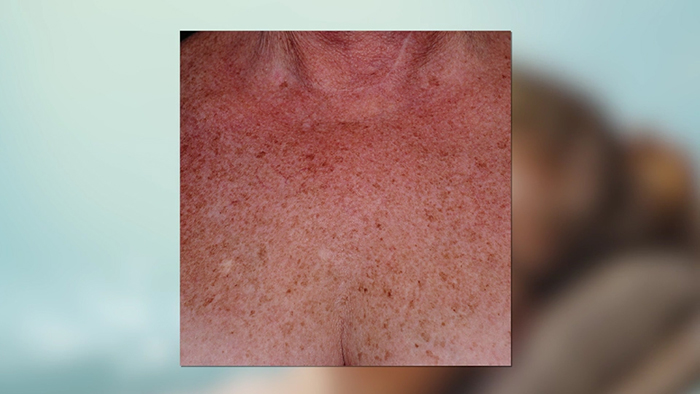The skin on a woman’s chest is often more delicate than the skin on the face. Starting sometime in their late 30’s to early 40’s, many women begin to notice some early signs of aging on their décolletage or cleavage area. Typically this manifests as brown spots, crepey skin, and vertical lines. It can not only adversely affect your wardrobe choices, but can also make you look older than you are. The level of damage is really going to depend on the amount of sun exposure you got before the age of 20. Dr. Christine Hamori of Massachusetts talks about the steps that a patient can take to improve the appearance of this highly visible area.
by Katherine Stuart
and Christine Hamori, MD
Prevention is Key
The easiest way to combat aging of the skin in general is to keep it from happening in the first place. As Dr. Hamori tells her patients, “prevention is the key”. The regular use of UVA/UVB sunblock on the face, neck, chest, and the back of the hands will keep you looking younger longer. If you’re going to the beach for a week with your family, wear a rash guard. There are really cute ones out there and they’re all SPF 50. Also, always wear a visor and stay under an umbrella. With all of the great fake tanners and bronzers on the market these days, there is absolutely no reason to prematurely age your skin with sun damage. And a tan, no matter how “healthy” you may think it looks, is sun damage.
Skin Care & Lasers Are Your Friends
What can you do once you start seeing brown spots? First, skincare is crucial. You want to be using a product like a retinol that’s going to cause exfoliation and increase cell turnover. Next, you’ll want to make an appointment to see a skin care specialist such as a plastic surgeon or dermatologist and have your skin assessed. You never want to go directly to an aesthetician at a non-medically related spa because the wrong type of treatment or order of treatments can actually make your symptoms worse. Your surgeon or dermatologist will come up with the treatment plan that best suits your skin and your needs.
The order of treatment usually goes as follows. Brown spots are typically addressed first with some kind of laser like IPL or a cream based product that reduces pigmentation. The important thing when treating “age” spots is to not go too far. “You do have to be careful because you can make them too light and have hypo-pigmentation,” says Hamori. Next, the underlying redness and/or broken blood vessels that usually accompany brown spots are then treated with a different laser or two depending on your condition. The vertical lines are then addressed. These are the hardest to treat as the skin is damaged on the DNA level. Hamori always tells her patients that, “it’s a year project.” Patients who have lighter skin color are usually more damaged and may take longer to look better, but they’re also less likely to experience hyper-pigmentation.
Once you’ve completed your treatment plan, you need to maintain your results with the continued use of a retinol product to keep the cells turning over and fresh as well as the daily use of a good sunblock. These two things go a long way in keeping your décolletage looking rejuvenated and fresh.


















Facebook
Twitter
Instagram
YouTube
RSS